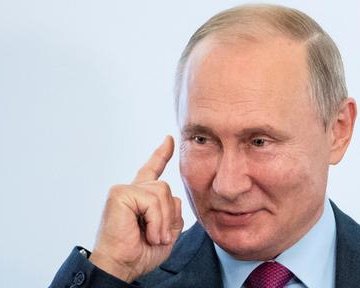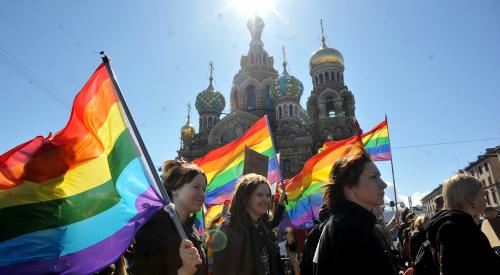- About
- Topics
- Story
- In-Depth
- Picks
- Opinion
- News
- Donate
- Signup for our newsletterOur Editors' Best Picks.Send
Read, Debate: Engage.
| topic: | Good Governance |
|---|---|
| located: | Russia |
| editor: | Igor Serebryany |
Russian Constitution could be amended to remove a loophole that allows the same person to be elected as President indefinitely, President Vladimir Putin said during his year-end press conference.
Article 81 of the Constitution prohibits the same person to run for President more than two terms in a row but says nothing about whether she or he has a right to do that if skipping one term.
Vladimir Putin utilized that loophole when running for the President the third time in 2012, following a four-year break.
In 2008-2012, the country's top post was occupied by Dmitry Medvedev. Putin hand-picked Medvedev as the Kremlin "caretaker" while moving himself to the second-highest job of the prime minister during that "intermission".
Putin once again employed article 81 when he ran for President in 2018. His fourth term in office expires in 2024.
Putin's unexpected remark demonstrates that the Kremlin has been studying the option of the power transition which would allow Putin to resign formally but remain in power de-facto, deputy head of the Center for Political Technologies Alexei Makarkin says.
"For Putin, the removal of the legal loophole in the Constitution hasn't been a crucial amendment. It is unimportant for him how many times his successor could stay in the Kremlin - because Putin has been busy looking for such a position which does not restrict his political influence formally, in any way", he assumes.
Makarkin believes that Putin is not going to repeat the 2008 option of "intermission", as "it's impossible to step into the same river twice".
"In 2008, Putin could use the prime minister's office as a sort of airport's VIP lounge. But in 2024, waiting in a "lounge", however luxurious, doesn't look 'comme il faut' for him. He has outgrown any existing post in the country's political structures. So by 2024, the Russian establishment has to create some new posts which will not decrease Putin's status", Makarkin says.
One of the problems for a smooth power transition is that Russia's political structure offers limited options for the president, who does not buy a prospective to become a lime duck one day.
"There are only two exit strategies. Either Putin will chair some Security Council which will be given superpowers, as what happened in Kazakhstan. Or some completely new office will be set up - for example, the President of the Russia-Belarus Union, or 'national leader', or anything else", the expert says.
Contrary to the Latin proverb that "it's not the places that grace the man but the man who graces the places", however monumental Putin becomes in 2024, he would be unable to aggrandize a post unworthy of his capabilities.
"Putin, like Kazakhstan's Nursultan Nazarbayev, is free to occupy any position he'd like to. His authority wouldn't diminish because of that. But, do agree, it'll look ridiculous if he moves to the chair of, say, Culture minister", Makarkin suggests. He predicts that Putin will refuse to become a power broker with no formal status.
"There are lots of nominal presidents who are puppets of the real masters. Take Iran or Kazakhstan. Their presidents are, in fact, subordinates of Ayatollah Khamenei or chairman of the Security Council Nazarbayev", Makarkin reminds.
In any case, it is worthless to make any predictions over Putin's future role before the parliamentary elections are due in 2021, deputy head of the Institute of History and Politics Vladimir Shapovalov notes.
"One may attempt to make a guess who Putin sees as his successor but that shouldn't be called a serious analysis. Such decisions have not been taken five years prior to the elections day", he stresses.
On December 31, Putin celebrates his 20th anniversary as Russia's President.

